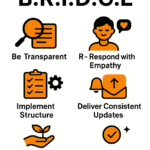Lawyers join the legal profession for various reasons. Nonetheless, it often boils down to offering a service.
The service element humanizes the legal profession. Therefore, anything that inhibits your capacity to remain grounded and function as a holistic human being is not doing you, your firm, or your clients any favors.
Unfortunately, the most prevalent work culture in the legal profession entails working long hours. Noreen Kidunduhu, the Founding Principal at Noreen & Co., recalls her earlier days in the profession.
“I remember my first years in the profession were hectic because I’d leave work at “ridiculous O’clock” and be back bright and early. There’s this idea that you had to put in the hours before you could lay back and rest and become an expert in your field.”Unfortunately, the “ridiculous O’clock culture” is the reality for most lawyers in Kenya’s legal arena, years in practice notwithstanding, yet it threatens their physical and mental well-being.
However, the pandemic forced everyone, including entities within the legal fraternity, to pay attention to mental well-being and prioritize self-care. For instance, the International Bar Association (IBA) commissioned a global study to establish the state of mental well-being among lawyers. Below is an overview of their findings.
Global Overview of Mental Well-being in the Legal Profession
The legal profession is among the most high-pressure professions globally. Consequently, legal professionals worldwide experience problematic stress levels from overwhelming job demands. In addition to heavy workloads, the emotive nature of sensitive cases takes a toll on many lawyers.
To this end, the IBA launched a global study in 2019 to address the mental well-being of legal professionals worldwide. Former IBA president, Horacio Bernades Neto, convened a Well-being Task Force comprised of IBA Bar Commission Officers and the IBA Legal Policy and Research Unit. The task force’s function was to conduct two surveys:
- A survey on individual lawyers
- A survey on law firms and other legal institutions (bar associations, law societies, and in-house legal departments)
IBA’s Well-being Task Force published the survey findings in a 2021 report titled “Mental Wellbeing in the Legal Profession: A Global Study.” Below is an overview of the report’s findings.
- One in three lawyers say their work has a negative or extremely negative impact on their well-being. The key issues contributing to difficulties with mental well-being include the stressful nature of the work, intensive work/time demands, poor work-life balance, and high levels of pressure. Moreover, bullying and harassment in the workplace have the worst effect on lawyers’ well-being.
The challenges above apply to lawyers in employment and legal entrepreneurs. However, besides the highlighted challenges, uncertainty and a lack of support are significant stressors for legal entrepreneurs.
- The average mental well-being score for lawyers globally falls within the World Health Organization’s “cause for concern” bracket. According to WHO, a 52% mental well-being score warrants screening by a mental health professional to determine whether the individual registering the score suffers from depression. The findings in this report show that the average score for respondents who participated in the survey was 51%.
- Young lawyers are among the groups most likely to experience greater difficulty with mental well-being. The same goes for other minority groups within the profession, including women and lawyers with disabilities.
- The stigma around mental health is a significant deterrent to addressing the issue within the legal profession. Almost half of the survey’s participants indicated that the fear of a negative impact on their career prevented them from discussing mental health within their respective workplaces.
According to the report, 32.1% of the legal professionals who shy away from conversations around mental health at the workplace do so because they fear they’ll be treated differently. Moreover, 17.2% fear that revealing their mental struggles may result in belittlement. Also, 24% believe that employers do not sufficiently recognize mental wellness issues.
Poor mental well-being has significant work and health-related consequences. Fortunately, the report established that employers in the legal arena are increasingly acknowledging the importance of mental well-being and have measures to support mental well-being at the workplace.
However, the level of support is subjective depending on an individual professional’s view. Nonetheless, most lawyers employ a range of healthy and appropriate self-care mechanisms to preserve their mental well-being.
In line with this, Noreen emphasizes the importance of living life holistically and having balance as legal professionals. She highlights that the “ridiculous o’clock work culture” does not have to be the norm. Instead, she advocates for taking consistent breaks from work rather than working for months and breaking for three weeks. “The pandemic showed us that balancing work and rest is possible. Also, more employers are opening up to the idea of flexi hours and hybrid working systems.”
The report backs her view on the post-pandemic/future legal profession. According to the report, individual legal professionals desire that law firms and other employers in the legal arena retain the work structures necessitated by the pandemic, including virtual meetings, working from home, limited travel, and flexible hours. Additionally, they want law firms and other organizations to convert their increasing knowledge of mental well-being into practical action.
Mental Well-being Among Kenyan Lawyers Analysis
What are the parallels between the findings in the IBA report and well-being among Kenyan lawyers? As highlighted above, lawyers are intentional about adopting habits and self-care routines that help maintain, enhance, or restore their mental well-being.
Therefore, we spoke to 20 lawyers across different areas of practice and at varying stages of practice to establish how they unwind to preserve their well-being. Our analysis of their feedback revealed that fitness, communing with nature, spirituality, and seeking professional help were among the avenues that they used to recharge and rejuvenate.
Moreover, some were vulnerable enough to share their journeys managing mental health diagnoses. This month of May, you can read more about the different ways in which Kenyan lawyers strive to achieve balance and mental wellness.
Bottom Line:
Well-being for lawyers is a personal and collective responsibility. On the personal front, our analysis shows that Kenyan lawyers, regardless of years in practice, are intentional about adding wellness-centric activities into their routines. We hope to inspire you to prioritize mental wellness in your career pursuits and become a wellness advocate in your sphere of influence.




















